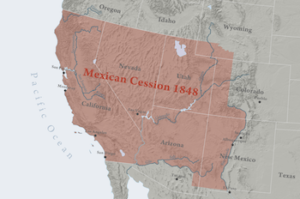
*On this date in 1846, the Mexican-American War, also known as the Mexican Civil War, began.
This military conflict was primarily motivated by the business interest of expanding slavery in America. Despite the 1836 Texas Revolution, from 1846 to 1848, in the wake of the 1845 US annexation of Texas, which Mexico considered part of its territory. The first major Mexican American War battle occurred at Palo Alto, near the US/Mexico border in Texas, on May 8, 1846. Combat operations lasted over a year until the fall of 1847. American forces quickly occupied New Mexico and California and then invaded parts of Northeastern Mexico and Northwest Mexico; meanwhile, the Pacific Squadron conducted a blockade and took control of several garrisons on the Pacific coast further south in Baja, California. Another American army captured Mexico City, and the war ended in a victory for the United States.
The Treaty of Guadalupe Hidalgo specifies significant consequences; it forced the Mexican Cession of Alta California and New Mexico territories to the United States in exchange for $15 million. In addition, the United States assumed $3.25 million of debt owed by the Mexican government to US citizens. Mexico accepted the loss of Texas and thereafter cited the Rio Grande as its national border.
American territorial expansion to the Pacific coast had been the goal of President James K. Polk. It was highly controversial, with the Whig Party, anti-imperialists, and anti-slavery elements strongly opposed. Heavy American casualties and high monetary costs were also criticized. Northern antislavery elements feared the rise of a Slave Power; Whigs generally wanted to strengthen the economy with industrialization, not expand it with more agricultural intended land. In the House of Representatives, John Quincy Adams of Massachusetts was among the most vocal opponents of the war.
Adams had first voiced concerns about expanding into Mexican territory in 1836 when he opposed Texas annexation. He continued this argument in 1846 for the same reason: war with Mexico would add new slave territory to the nation. Joshua Giddings led a group of dissenters in Washington, D.C. He called the war with Mexico “an aggressive, unholy, and unjust war” and voted against supplying soldiers and weapons. Fellow Whig Abraham Lincoln contested the causes of the war. Northern abolitionists attacked the war as an attempt by slave owners to strengthen the grip of slavery and thus ensure their continued influence in the federal government. Acting on his convictions, Henry David Thoreau was jailed for his refusal to pay taxes to support the war and penned his famous essay Civil Disobedience.
The Defenders of the war alleged that the actions of Mexican military forces within the disputed boundary lands north of the Rio Grande constituted an attack on American soil. The war’s advocates viewed New Mexico and California territories as nominally Mexican possessions with tenuous ties to Mexico. They saw the territories as unsettled, ungoverned, and unprotected frontier lands, whose non-aboriginal population, where there was none, represented a substantial in places, even a majority American component. Moreover, America’s rival on the continent, the British, feared the territories to be under imminent threat of acquisition.
President Polk reprised these arguments in his Third Annual Message to Congress on December 7, 1847. In it, he scrupulously detailed his administration’s position on the origins of the conflict, the measures the US had taken to avoid hostilities, and the justification for declaring war. He also elaborated upon American citizens' many outstanding financial claims against Mexico. He argued that, given the country’s insolvency, the cession of some large portion of its northern territories was the only protection realistically available as compensation. This helped to rally congressional Democrats to his side, ensuring passage of his war measures and bolstering support for the war in the US. The political aftermath of the war raised the slavery issue, leading to intense debates that pointed to civil war; the Compromise of 1850 provided a brief respite.
In the US, increasingly divided by sectional rivalry, the war was a partisan issue and an essential element in the origins of the American Civil War. Most Whigs in the North and South opposed it; most Democrats supported it, with Southern Democrats, animated by a widespread belief in Manifest Destiny. This belief supported it in the hope of adding slave-owning territory to the South and avoiding being outnumbered by the faster-growing North. John L. O’Sullivan, the editor of the Democratic Review, coined this phrase in its context, stating that it must be “our manifest destiny to overspread the continent allotted by Providence for the free development of our yearly multiplying millions.” The war officially ended on February 2, 1848.